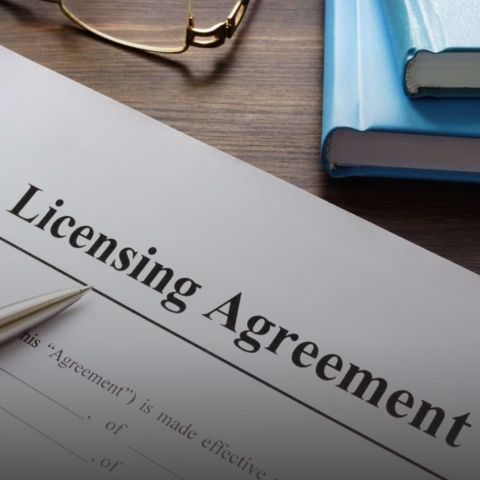
IP Licensing Agreements

Protect yourself from infringement of IP with a well drafted Licensing Agreement.
What is an IP Licensing Agreement?
IP Licensing Agreements are used in merchandising or software licences. But these are just a couple of typical examples.
A licence agreement is a contract under which the holder of intellectual property (licensor) grants permission for the use of its intellectual property to another person (licensee), within the limits set by the provisions of the contract.
Without IP Licensing Agreements, the use of the IP without the prior consent of the originator of the content would be considered as an infringement of IP.
As one of the highest rated Sydney-based IP law firms, you can count on us for expert legal services that are affordable, personable and reputable.
Benefits of IP Licensing Agreements
IP licensing agreements offer various advantages.
- Firstly, they enable the licensor to generate revenue by permitting others to use their intellectual property (IP). This expands market reach without direct involvement.
- Secondly, licensees gain access to valuable IP, reducing development time and costs.
- Thirdly, risk sharing occurs as licensors can offer guidance and support.
For help with Licensing Agreements, please get in touch.
Article: things to consider in IP Licensing Agreements
Advantages of licensing your IP
Licensing, as opposed to complete transfer or assignment of IP, provides the owner with several advantages.
- By retaining ownership, the seller (licensor) retains title and typically has an easier time reversing the transfer of rights if the buyer (licensee) doesn’t live up to their end of the bargain.
- In many instances, the party seeking to acquire the IP rights does not have sufficient financial resources to pay the full value up-front – or may perceive the IP as highly speculative but be willing to pay more if the technology can be successfully commercialised.
- A well-drafted license agreement therefore not only gives the licensor an opportunity to more readily terminate the agreement if future payments are not made, but also allows the parties to “share in the upside.”
- License agreements can also delineate the responsibilities of each party for maintaining or enforcing the patent rights.
Overall, licensing allows greater flexibility. And the risk of over or undervalued IP will be reduced. If the desired revenue strategy is a stream of income, then licensing is often the most appropriate choice. That is royalties or contingent payments.
It might be advantageous for a business to have a holding company which holds all the intellectual property and other assets in a business. That is to licence that IP to a trading company which is the entity exposed to litigation or risk. The assets of the business are more protected in the event that the trading entity is exposed or is liquidated, administrator appointed or wound up. That’s because they are situated in a different legal entity to the trading company. Many businesses with a large amount of intellectual property use this legal strategy. It’s a way of reducing the risk of the overall business.
When is granting or taking a licence not appropriate?
If you have the ability to commercialise your own IP, you might be better off doing it yourself. You should be wary of licensing your IP to companies who might lessen the value of the IP.
For example:
- If you are licensing a trade mark you will want to consider whether the quality of your brand will be affected by the goods it is applied to.
- If you are looking at buying rights to IP, the prospective licensor may want to charge royalties that are too high and may restrict the growth of your business.
- The IP to be licensed may be too weak – if a competitor could work round it and take away market share, it may not be worth you investing in a licence.
Should you use a free online licence agreement template?
There’s always a risk to using a free online licence agreement template. This is due to the fact that the template was not drafted with your particular situation in mind and may be missing a number of key areas that would protect your business.
Having the agreement drafted by a lawyer is best practice to ensure your business is protected to the highest degree possible.
Important points to consider in IP Licensing Agreements

1. Type of licence
There are three main types of Intellectual Property (IP) licences. The first is an exclusive licence, which provides the licensee the right to use and exploit the IP of the licensor on an exclusive basis. The licensor is not permitted to use the IP in any way in this case. The second type is a non-exclusive licence which also allows the licensee to use and exploit the IP, but the licensor can allow other parties to exploit the IP as well. Another type of licence is a sole licence, which is similar to an exclusive licence in that it doesn’t allow the IP to be licenced to other parties, but the licensor may still continue to use their IP.
2. Identify the IP
You need to identify what type of intellectual property is involved, which may be more complicated than you might think. The reason for this is because the IP could be related to confidential information and trade secrets, in addition to the key forms of IP such as, trade marks, copyright, patents and designs.
Having identified the IP involved in the licence, you need to provide a clear definition of the IP being licenced under the IP licence agreement.
3. Will the licence operate for a term period or on a perpetual basis? Is it revokable or irrevocable?
It’s necessary to consider how long the licensee is permitted to use your IP. An option is to have the licence limited to a particular term by stating when the licence will start and end. The effect of this is that when the term finishes the agreement terminates. Another option is to provide a perpetual licence, the effect of which is that the licence would continue on an indefinite basis, unless terminated by the parties.
When a licence is revokable you are able to stop the licensee from using the IP at any point during the term of the licence and you may terminate the agreement, if necessary. However, if the licence is irrevocable you are not able to withhold your permission to use the IP. The licensee is less restricted in this sense. Although, you can still terminate the licence in accordance with the licence agreement.
4. Assignability
Would you allow a licensee to transfer their rights to use your IP to third parties? If yes, then you can include in the agreement that the licence is assignable. If you don’t want any other party, except the licensee, using your IP, you need to include in the agreement that the rights provided in the licence agreement are not able to be assigned or transferred. It’s possible to allow the licensee to sub-licence to third parties, but you should consider whether this is appropriate for your specific circumstances.
5. Territory
It’s a good idea to consider whether the licence will apply to a specific territory. For instance, an IP licence agreement could apply to all of Australia or only to the state of New South Wales, meaning the licensee could only use the IP in that specified location. In some instances, you will only have IP rights in Australia and are not able to licence IP rights outside of this territory. This would be the case if you had a trade mark registered in Australia, but not in other countries.
6. Warranties
The licensee should provide certain warranties, including, but not limited to the following:
- all rights, title and interest in the licenced property are retained by you, the licensor, subject to the grant of licence in the licence agreement;
- all IP materials will be stored in a secure location;
- all IP materials will not be copied or duplicated for any purpose other than the licenced purpose; and
- the licensee will not by any act or omission prejudice the intellectual property in the licensed property or deal with the licensed property, so that any third party may obtain a lien or any other right or claim that is incompatible with the rights of the licensor.
7. Confidentiality
This is one of the most important aspects of an IP licence. It is important to protect your trade secrets and other information that are generally not available to the public. The IP licence should require that the licensee must not use or disclose material relating to the IP or other confidential information, except for the purpose agreed between the parties.
8. Termination
You should include a termination clause that provides that you are able to terminate the licence agreement if the licensee breaches a material term of the agreement. You should also outline circumstances which would give rise to a right to terminate.
You need to specify the consequences of termination of the licence agreement. For example the termination clause should state that the Licensee must deliver to you all documents and other materials (including all copies) in their possession relating to the IP and do such further things as may be reasonably required by you to protect your right, title and interest in the IP.
Examples of different licensing agreements
Examples of different licensing agreements include:
- Software licensing agreement
- Trademark licensing agreement
- Franchise agreement
- Patent licensing agreement
- Copyright licensing agreement
- Merchandising licensing agreement
- Real estate licensing agreement
- Content licensing agreement
- Video licensing agreement
- Brand licensing agreement
- Apparel licensing agreement
- Photo licensing agreement australia
- Image licensing agreement
- Music licensing agreement
- Product licensing agreement
- Exclusive licensing agreement
- Non-exclusive licensing agreement
- Cross-licence agreement.
Key Takeaways
IP licensing agreements are complex documents, but when well drafted they are an effective way to exploit your IP, manage your relationship with the licensee and make their obligations clear. It’s important to seek legal advice to ensure that the agreement covers all important areas.
We can draft your IP Licence Agreement for a fixed fee $850+ GST, fully tailored for your business and drafted by a qualified lawyer.
“The team at Progressive Legal really takes the time to understand their clients business and needs. We consider the crew an asset to our business.”
Julian Haines, founder at The Bucks Co.
Contact a trusted Licensing Agreement lawyer today
Please get in touch with us via phone or the contact form on this page. We’ll make sure to get back to you within a day.

 Our License Agreement lawyers are ready to help you. Our office is conveniently located in Sydney: 801, Level 8/100 William St, Woolloomooloo NSW 2011 (
Our License Agreement lawyers are ready to help you. Our office is conveniently located in Sydney: 801, Level 8/100 William St, Woolloomooloo NSW 2011 (
